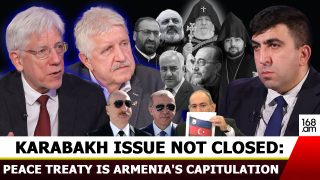War May Resume `at any Moment,’ Armenian President Warns: Bloomberg
War can break out “at any moment” in the Caucasus flashpoint of Nagorno-Karabakh and there’s little prospect of talks to resolve the conflict, the president of Armenia said.
A Russian-brokered truce may not be enough to prevent fighting “on an even larger scale” after “four days of war” between Azeris and Armenians this month that involved “several hundred tanks” and 30,000 artillery rounds, Serzh Sargsyan said in an interview Saturday at the presidential residence in the Armenian capital, Yerevan.
It’s “unreasonable” for Armenia to return to peace talks with Azerbaijan over the disputed territory without security guarantees because “the situation is entirely different now,” he said. “On the one hand we’d be talking somewhere while, on the other, military officials would be engaging in war here to try to settle the conflict,” he said.
The clashes in early April were the worst since a cease-fire 22 years ago halted a war that claimed 30,000 lives and created one million refugees. Armenians took over Nagorno-Karabakh and seven surrounding districts of Azerbaijan in the 1991-1994 war. International mediators have failed to negotiate a lasting peace since then in a conflict that threatens to destabilize a region flanked by Russia, Turkey and Iran, while also potentially disrupting a new energy corridor between central Asia and Europe.
Battle ‘Ultimatum’
Azerbaijan, the third largest oil producer in the former Soviet Union, has attracted more than $50 billion from BP Plc and its partners in recent years. BP’s oil pipeline which carried 720,000 barrels per day from Baku to the Mediterranean last year runs fewer than 30 miles from the conflict zone at one point.
About 100 Armenian soldiers and civilians died in the latest fighting, while the Azeri Defense Ministry said its forces lost 32 troops. Amid intense international diplomacy to avert a full-scale war, Sargsyan held talks with Russian Foreign Minister Sergei Lavrov in Yerevan on Friday. Lavrov told Azeri President Ilham Aliyev at talks in Baku on April 6 that Russia has “proposals” for resolving the conflict.
Lavrov didn’t “bring any new proposals” because “he realizes very well that it doesn’t make sense to talk about negotiations immediately after a four-day war,” Sargsyan said. Battles were fought along the full 200-kilometer length of the front line as Azerbaijan tried to punch through to Nagorno-Karabakh itself and then “issue an ultimatum” to the Armenian-held enclave, he said.
Truce Violations
Both sides accused each other Sunday of new truce violations. Azeri troops destroyed a tank as they repelled an Armenian attack, the Defense Ministry in Baku said on its website. Azeri forces broke the cease-fire 159 times, including with artillery, the Defense Ministry of the Nagorno-Karabakh Republic, which is not internationally recognized, said on its website.
Sargsyan, 61, who’s a former military commander from Nagorno-Karabakh, acknowledged for the first time publicly that Armenians lost some territory in the fighting. Azeri troops took “very small pieces” of land in the north and south of the contact line that “had no strategic importance” for Armenian forces, who didn’t try to reclaim them “to avoid additional losses” of life, he said.
Russian Peacekeepers
While the chief of the defense staff in Moscow mediated the cease-fire talks, there’s no place for Russian peacekeepers in the conflict zone to separate the two sides, Sargsyan said. While talk of Russian forces being deployed “wasn’t entirely without grounds” in previous peace negotiations, “I don’t see any such opportunity” now, he said.
“If there are no negotiations, how can Russian forces appear in Karabakh or between Azeri and Karabakh forces?” Sargsyan said. Russia’s pursuing a “balanced policy” between Armenia and Azerbaijan while seeking to avert “large-scale military conflict,” he said.
Armenia has a mutual-defense pact with Russia and hosts its ally’s only military base in the region, though Armenians protested this month outside the Russian embassy in Yerevan over weapons sales to Azerbaijan. Russia will continue selling weapons to Armenia and Azerbaijan as “both these countries are our strategic partners,” Deputy Prime Minister Dmitry Rogozin said, the Tass news service reported April 8.
Peace Deal
Flush with cash before the collapse in crude prices, oil-rich Azerbaijan boosted military spending 10-fold over the last decade to as much as $4.8 billion last year, according to authorities in Baku, more than Armenia’s entire state budget. Armenia’s defense budget rose threefold over the same period to $447 million, according to the Stockholm International Peace Research Institute.
Sargysan said Russian, U.S. and French mediators from the Organization for Security and Cooperation in Europe must put in place “confidence-building measures” before any new peace talks, and particularly “an investigation mechanism for violations of the cease-fire that would pinpoint exactly which party” was responsible. Armenia also requires “assurances that these kinds of violations will not happen again,” he said.
The president disclosed that he’d been willing to withdraw Armenian forces from five districts of Azerbaijan and allow in peacekeepers as part of 2011 negotiations with Aliyev in the Russian city of Kazan. The Russian, U.S. and French presidents urged both leaders to resolve the conflict by signing the agreement, which would also have postponed a final decision on Nagorno-Karabakh’s status, but Aliyev refused, Sargsyan said.
Azerbaijan says any settlement must be based on respect for its territorial integrity including Nagorno-Karabakh. Armenia says the enclave’s Christian Armenians, who declared independence from largely-Muslim Azerbaijan in 1991 as the Soviet Union collapsed, have the right to self-determination.
“That was the time when Azerbaijan was enriching itself with oil money and talking about the size of its military budget,” Sargsyan said of the failed 2011 talks. “What took place now should have been expected.”

























